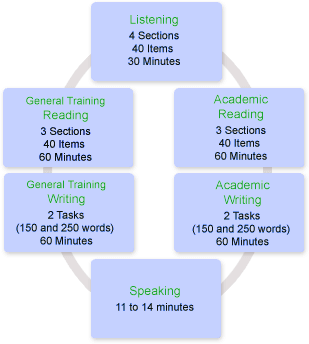What is IELTS?
IELTS, the International English Language Testing System, is designed to assess the language ability of candidates who need to study or work where English is the language of communication.
IELTS is jointly managed by the University of Cambridge ESOL Examinations (Cambridge ESOL), British Council and IDP: IELTS Australia. IELTS conforms to the highest international standards of language assessment.
IELTS is recognised by universities and employers in many countries, including Australia, Canada, New Zealand, the UK and the USA. It is also recognised by professional bodies, immigration authorities and other government agencies.
Note: This website is NOT the same or connected or associated with any of the IELTS Test Partners. If you want to prepare yourself for IELTS exam, you are in the right place! But if you are looking for information about registering for the IELTS, test dates or test fees, visit the official IELTS website, www.ielts.org.
Where can I take IELTS?
More than 400 test centers around the world administer IELTS. Most test centers are run by the British Council, IELTS Australia, or universities and language schools. Some testing centers also offer off-site testing for large groups by prior arrangement with IELTS. Contact your local examination center or visitwww.iefts.org to find out where the nearest IELTS test center is located.
Where can I find information about registering for the test?
You can contact your nearest examination center or visit the official IELTS website for more information about application procedures and the location of a test center near you.
The Test Format
There are four sub-tests, or modules, to the IELTS test: Reading, Writing, Listening and Speaking. Students must sit all four sub-tests. While all students take the same Listening and Speaking tests, they sit different Reading and Writing tests, depending on whether they have selected the Academic IELTS test or the General Training IELTS test.
On the day of the test, the four subsections will be taken in the following order:
There are four sub-tests, or modules, to the IELTS test: Reading, Writing, Listening and Speaking. Students must sit all four sub-tests. While all students take the same Listening and Speaking tests, they sit different Reading and Writing tests, depending on whether they have selected the Academic IELTS test or the General Training IELTS test.
On the day of the test, the four subsections will be taken in the following order:

Total Test Time
2 hours 45 minutes
2 hours 45 minutes
The Speaking test may even take place a day or two later at some centres.
IELTS listening test lasts for about 30 minutes. It consists of four sections, played on cassette tape, in order of increasing difficulty. Each section might be a dialogue or a monologue. The test is played once only, and the questions for each section must be answered while listening, although time is given for students to check their answers.
IELTS Reading test lasts for 60 minutes. Students are given an Academic Reading test, or a General Training Reading test. Both tests consist of three sections, and in both tests the sections are in order of increasing difficulty.
IELTS Writing test also lasts for 60 minutes. Again, students take either an Academic test, or a General Training test. Students must perform two writing tasks, which require different styles of writing. There is no choice of question topics.
IELTS Speaking test consists of a one-to-one interview with a specially trained examiner. The examiner will lead the candidate through the three parts of the test:
An introduction and interview, an individual long turn where the candidate speaks for one or two minutes on a particular topic, and a two-way discussion thematically linked to the individual long turn. This interview will last for approximately 11-14 minutes.
IELTS listening test lasts for about 30 minutes. It consists of four sections, played on cassette tape, in order of increasing difficulty. Each section might be a dialogue or a monologue. The test is played once only, and the questions for each section must be answered while listening, although time is given for students to check their answers.
IELTS Reading test lasts for 60 minutes. Students are given an Academic Reading test, or a General Training Reading test. Both tests consist of three sections, and in both tests the sections are in order of increasing difficulty.
IELTS Writing test also lasts for 60 minutes. Again, students take either an Academic test, or a General Training test. Students must perform two writing tasks, which require different styles of writing. There is no choice of question topics.
IELTS Speaking test consists of a one-to-one interview with a specially trained examiner. The examiner will lead the candidate through the three parts of the test:
An introduction and interview, an individual long turn where the candidate speaks for one or two minutes on a particular topic, and a two-way discussion thematically linked to the individual long turn. This interview will last for approximately 11-14 minutes.
Source: http://www.ielts-exam.net/
Comments
Post a Comment